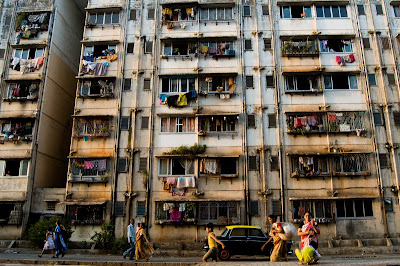I spent last weekend in Mumbai, where I went out and about with Coro, a small NGO funded by Action Aid. Much of their work is done in the traditional urban slums, among communities who don’t get water, proper sanitation and have to fight for their rights.
One thing that came up when I was there struck me as interesting. Next to two of the three slums we visited were seven and eight story apartment blocks, looking as though they were crumbling away despite being no more than two or three years old.
These, Coro director Sujata Khandekar told me, were being thrown up by the government to replace the jhuggies , or temporary illegal housing – freeing up valuable real estate land in an overcrowded, landlocked city. The problem is that they are not always the best solution for all concerned.
Some developers appear – through corruption – to be breaking the rules and building the tower blocks almost on top of each other. These pictures don’t reflect it but the blocks I saw the previous day couldn’t have been more than 4m apart. In those cases, light, ventilation and aesthetic environment are all a problem.
Secondly, the maintenance charges are very high – putting pressure on families who rely on casual work such as labouring and rag-picking and who live their lives below the poverty line. Thirdly, they are moving people from all ethnic, religious and migrant communities and throwing them into buildings side by side – causing all manners of stresses between Indians who struggle to communicate or share different customs.
And finally, many of these buildings lack the essential modern conveniences that were promised at the start. There may be no working toilets fitted and little running water – meaning the family on floor eight is not in any better situation than they were in a wooden hut. This is by no means the case for all developments and families, but has been the experience of Coro.
Khandekar says: “They are kicking the weakest people in our society out of horizontal slums and replacing them with vertical ones, just to shut them up and cram more in. Just to reassure them that they’re doing something for them. But for many people, their lives aren’t really improving as a result.”
